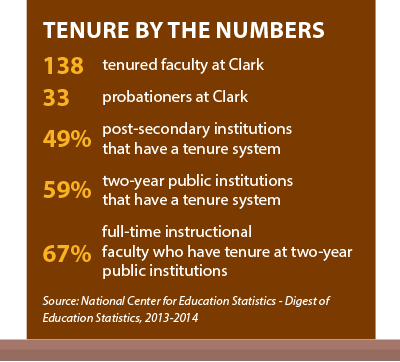Building academic excellence
Tenure is a contentious topic. Some in the media, politicians, parents and even administrators have spoken out against the process and institution of tenure. These arguments have ranged from issues around academic standards to those of tenured faculty members who are unqualified or misbehaving without repercussions. Here at Clark College, some question why tenure exists.
Nationally, the concept of tenure grew out of a need to provide faculty with some protections from boards of trustees and donors who influenced hiring and firing, how faculty were disciplined, and in some cases, curriculum. Tenure allowed faculty members to have financial security and academic freedom, while also serving as a retention tool. This eventually led to the 1940 Statement of Principles on Academic Freedom and Tenure, which provided a common understanding of academic freedom and tenure, and procedures for providing tenure within colleges and universities.
Tenured faculty at Clark create a solid foundation for curriculum development and student learning by providing consistent and academically rigorous teaching methods developed over time. Tenure also provides faculty with the security and structure that allows them the freedom to experiment and innovate.
“Our faculty earn tenure based primarily on their teaching abilities, which ensures that our students are getting a top-notch learning experience from dedicated professors,” said Tim Cook, vice president of Instruction.
“Tenured faculty are often with the college for a good portion of their professional careers. During this time, they enrich the campus and help define the culture of the college through their participation and commitment. This also allows them time to test new approaches and develop academic programs based on their experience,” he added.
Academic excellence
While tenure can be about supporting individual instructors, it also creates a system for academic excellence. By engaging in the tenure process, instructors become part of an educational team that enhances their professional growth, and in turn, student learning. At Clark, there is a three-year evaluation period that tenure-track faculty members—also known as probationers—participate in, including classroom observations, mentoring, assessments and personal reflection. Probationers are under the guidance of a tenure committee, which consists of their department dean, two faculty members in their discipline and one faculty member outside the discipline. During the evaluation period, the committee provides detailed feedback, advice and guidance to facilitate growth and improve teaching skills.
Alan Wiest, a faculty member in the Health and Physical Education department, was granted tenure in 2015. He believes that tenure creates a consistent, systematic process for subject experts to take the time necessary to become better educators.
“My years as an adjunct and interim full-time faculty member were invaluable growth opportunities, but I was never formally educated to teach. Teaching was something I learned by doing, and I got pretty good at it by myself,” said Wiest.

Alan Wiest, newly tenured at Clark, assists aspiring scientists during the Science Olympiad in 2013.
“In the past, I was more of a ‘push’ teacher and delivered information in amazing ways,” he said adding, “But I missed a lot of ‘pull’ opportunities to allow students to ask questions or redirect the conversation. The tenure process gave me the time and space to learn teaching methods that shifted my thoughts from how well I am teaching to how well students are learning. It made me love teaching even more.”
Teamwork
A love of teaching is just part of what drives faculty members to pursue tenure. Building an innovative academic program takes a team. Like with any good team, developing the skills of individual members is a key part of strengthening the whole. The tenure process helps guide that skill development, resulting in well-rounded instructors who do much more than just teach.
“I don’t think I could have had such rapid growth as a professor and professionally without the resources that were provided to me during the tenure process,” said Joan Zoellner, a Mathematics faculty member, who received tenure in 2015.
When Erin Schoenlein was an adjunct instructor at other institutions, she felt isolated and disconnected from her colleagues and the campuses.
“At Clark, I’m part of a healthy team of educators who all care about student learning and success, and who love to teach,” said the tenure-track faculty member in Clark’s Transitional Studies program.
As part of a team, tenured faculty members become more deeply engaged on campus. They join committees, spend more time with students, and take on leadership roles. Tenure allows faculty to become active members of the larger college community.
“Tenure supports students, curriculum and the organization in a bigger way than only being in the classroom. Your focus is not just students and teaching; it also includes curriculum development, relationships and assessment development. You build relationships that benefit students. This positive and inspiring environment makes showing up for work and loving your job easy,” Schoenlein said.
Peer-to-peer connections, a willingness to mentor and opportunities to enhance teaching methods are all ingredients that engage faculty to create and sustain a dynamic curriculum that advances how students learn and prosper.
Toccara Stark is Clark College’s director of marketing.





